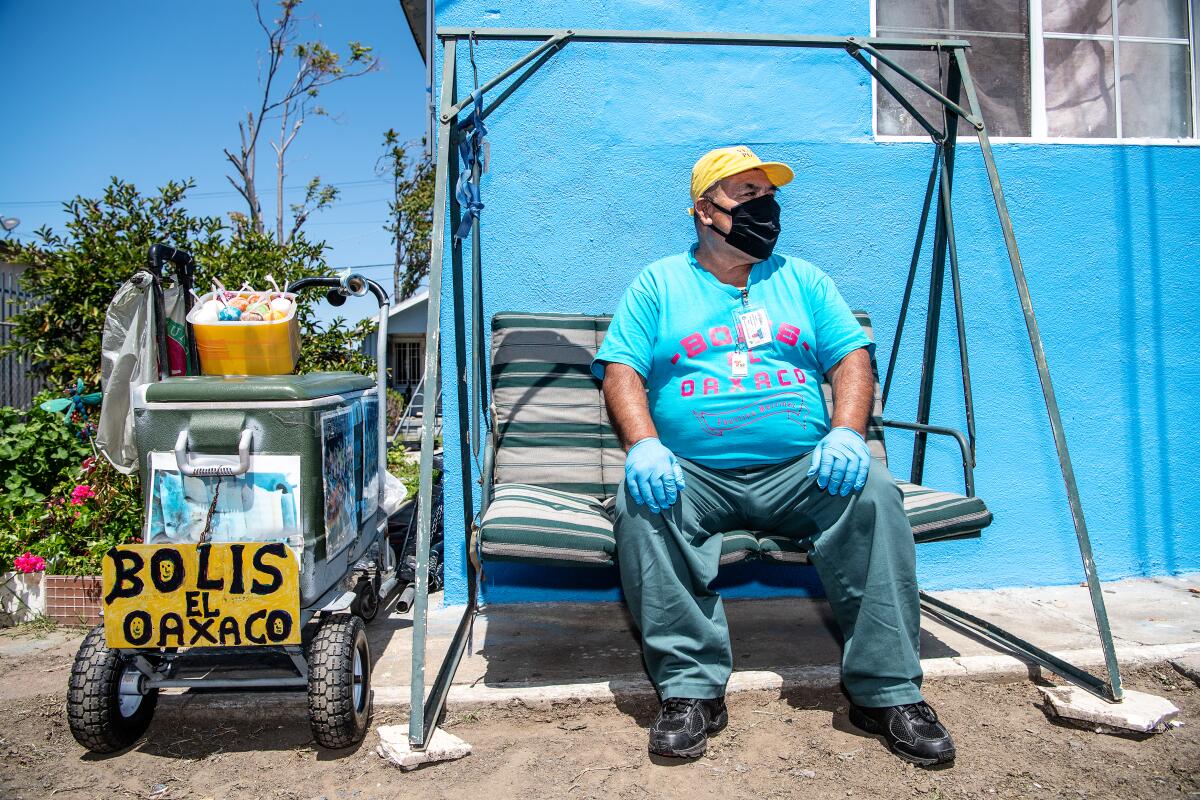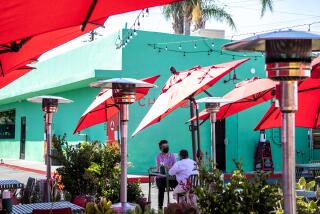Column: L.A.’s reopening plan is leaving our street vendors in the dark

- Share via
When the coronavirus shut the city down, there were few in the food community more affected than street vendors.
After years of fighting, street vending had finally been legalized in L.A. last year. But amid fears about public health and safety during a pandemic, vendors were ordered to close. In addition to losing the fees ($291) that many had already paid to the city, gone was the progress that thousands of vendors, many undocumented and/or from immigrant communities, had made to finally be able to sell their sliced fruits and vegetables, pozole and mulitas on sidewalks without fear of punishment.
In the context of flattening the COVID-19 curve, instituting a temporary moratorium on vending was understandable. But with L.A. restaurants given the green light to reopen their dining rooms last week and with protesters flooding the streets, the ban on sidewalk and street vending for the sake of public safety seems more and more absurd.
On Friday Mayor Eric Garcetti launched his “L.A. Al Fresco” initiative to provide restaurants cost-free permits to use public spaces such as sidewalks and private parking lots — but he did nothing to address street vendors’ rights to conduct business.
On Wednesday, the L.A. City Council convened to weigh a motion to expedite permitting for use of sidewalks and public space. Councilman Joe Buscaino moved to amend the motion to include eligibility for street vendors, who were not mentioned in the original language of the legislation. The motion was kicked back to committee despite passionate, urgent testimony from many vendors who called in.
“I haven’t been working since the pandemic and I’m concerned about the welfare of my children. I can’t pay my rent — I owe three months of rent,” said Ana Cruz, a vendor in Hollywood.
“Unfortunately, the rent doesn’t wait. The bills don’t wait,” said Merced Sanchez. “Now we see that the city has a program that only benefits restaurants.”
“We have been struggling 10 years for that sidewalk,” said Melida Alvarado. “And they have always restricted us because of public security. It’s unfair that you’re giving restaurants use of the sidewalks without permits and we’ve had restrictions for so long.”
Branimir Kvartuc, spokesman for Councilman Buscaino’s office, described the councilman as “disappointed” at today’s inaction. “There is no reason to disallow the vendors from going back to work,” he said.
Sending things back to committee “is a bit of a black hole.”
But every passing day is vital to the livelihood of the vendors, who have been without work or assistance since March.
And this negligent, hypocritical farce endangers one of the most valuable — and certainly one of the most vulnerable — populations in our food community. Restaurants were able to apply for loans and grants from the government, but street vendors, who number 50,000 by some estimates, have received no such lifeline.
Many face language or logistical barriers in applying for state and federal aid, or are undocumented and thus ineligible. The city offered a modest debit card program that was open to all L.A. residents experiencing poverty regardless of legal status — not just street vendors. 450,000 people applied; between 10,000 and 15,000 cards were issued.
“Before the crisis hit, vendors were by and large subsistence earning,” said Doug Smith, an attorney with public interest law firm Public Counsel. “They’re facing a real threat or reality of homelessness.”
“You can’t be tone deaf or blind to the history of public space in L.A. and the ways different people experience public space differently and have different access to it,” said Smith.
He said street vendors have a long history of being excluded from the public discourse, despite their value economically, culturally and nutritionally: In food deserts, vendors can sometimes be the lone source of fresh fruits and vegetables.
Historically, street vendors are an “immigrant workforce that was prevented from building a business,” he said, and subject to “really troubling consequences” due to vendor criminalization, including hefty fines and confiscation of equipment. With the Trump administration, he said, the situation is even more dire: Vendors have become prioritized for deportation.
“Unfortunately, we have seen examples of vendors seeing deportation proceedings simply because they were selling elote on the street,” Smith said.
In a Twitter thread posted Wednesday, Smith outlined ways to begin addressing the issue. It begins with including street vendors in the mayor’s initiative. Other ways to help, he said, might include leveraging things like school and church kitchens to help vendors abide by the county’s health permitting requirements.
Vendors are desperate for a lifeline. Long ignored and now abandoned by our government, this vital segment of our population is in extreme danger. With so many unable to take advantage of our federal and state programs, the mayor must use his power to re-legalize street vending, immediately. He must include street vendors in this reallocation of our public space, and quickly refund any fees paid by them for licenses. Finally, the mayor and city at large should find ways to provide support and opportunities for them to succeed in the future.
More to Read
Eat your way across L.A.
Get our weekly Tasting Notes newsletter for reviews, news and more.
You may occasionally receive promotional content from the Los Angeles Times.











